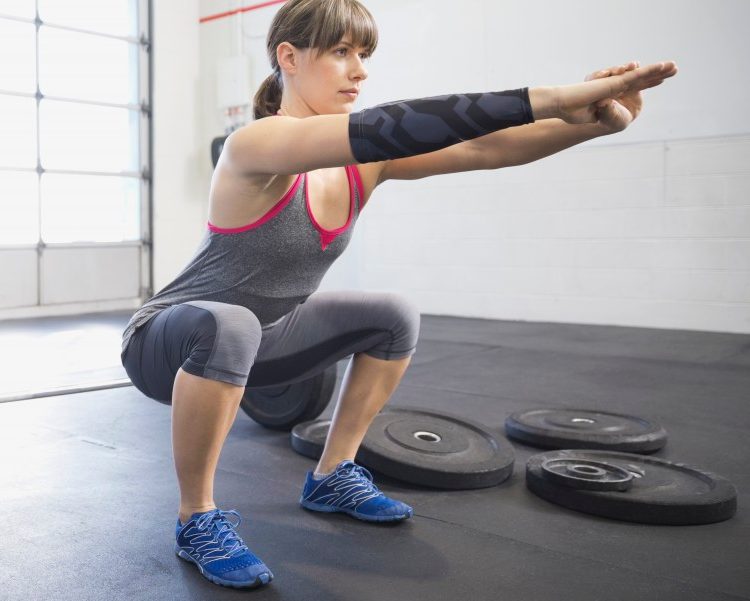What Is Functional Fitness?

You’re an avid exerciser; but does running 5 miles or bench pressing 200 pounds help you live better? Functional fitness workouts do what your body was meant to do.
Do you still play? When was the last time you climbed a tree or hopped from rock to rock to ford a stream? Chances are you stopped “playing” sometime in your childhood. But those physical challenges you accomplished because they were fun then could be the key to maintaining your physical functionality now.
Functional fitness (also called neuromotor fitness) is not a new philosophy, but it’s increasingly being emphasized in some of the newly popular exercise modalities. CrossFit, Parkour, MovNat, and bodyweight training all stress elements of functional fitness. Feldenkrais, Alexander, Pilates, Tai chi and yoga are also examples of practices that enhance functional fitness.
YOU MIGHT ALSO LIKE: Morning Exercise Boosts Weight Loss
What is functional fitness?
Functional exercise helps you perform activities of daily living by incorporating motor skills with strength training.
Functional exercises involve multiple muscle groups and enhance your ability to do a particular movement, for example a lunge or a squat, rather than focusing on an individual muscle, as in a bicep curl.
You’ll boost your balance, range of motion, and awareness of how your body is oriented in space (proprioception) as you learn to coordinate your movements in a more complex way, explained Carol Ewing Garber, PhD, past president of the American College of Sports Medicine and a professor of movement sciences and education at Columbia University in New York.
Your approach to functional fitness will depend on your goals.
- Are you an athlete trying to improve your competitive performance?
- Were you injured and are trying to regain your functionality?
- Are you simply trying to improve your ability to do the things you do every day without becoming fatigued?
Functional exercise plays a role in all of these efforts and is especially beneficial for older adults because it can improve balance, agility, strength, and coordination, so it’s helpful in preventing falls and other injuries, in addition to improving quality of life.
Beyond daily living, functional fitness can help boost your performance in sports. You’ll focus on training to perform optimally the various motions required, Garber explained.
Functional fitness workouts can be challenging
Some fitness training methods might be considered highly challenging, even extreme. CrossFit and boot camps, or military style training, are well known as intense forms of exercise. Some less well-known regimes, such as MoveNat and some survival schools, take their participants outdoors and use what’s found in nature to provide physical challenges and conditioning.
“There always are new configurations and bringing different types of fitness trends together to make new things to keep people’s interest,” Garber said.
For some people, this type of exercise may be appropriate.
You can still benefit from functional fitness workouts
If these hardcore workouts aren’t for you, functional fitness training can still benefit your exercise routine. If you’ve been inactive, start with a goal of meeting the recommendation for 150 minutes of moderate aerobic exercise per week, with muscle strengthening activities that include all major muscle groups on 2 or more days. Make sure you talk to your doctor before starting this, or any, exercise program.
If you’re already active, but don’t have a strength training component, add it.
“It helps maintain your muscle strength and keeps your bones healthy and increasingly we’re learning that it’s also very helpful with preventing some of the chronic diseases like diabetes and heart disease,” Garber said. “It certainly makes a big difference in healthy aging.”
Don't overdo it
People who rapidly go from little or moderate activity to large amounts of exercise are more prone to injury. If you decide you want to try one of the more challenging programs, build up gradually and keep your expectations reasonable.
“Adding more intensity or longer duration of your exercise program would be something for people to consider, and I certainly would recommend that, but I think it’s also a fine balance. If you’re doing something that works for you and you’re doing it regularly without fail, try not to make huge changes because it derails you,” she said.
If you’re looking for a more moderate way to incorporate functional fitness into your workout, consider a session or two with a personal trainer who can create an individualized workout routine to meet your specific goals.
Updated:
November 08, 2022
Reviewed By:
Janet O’Dell, RN